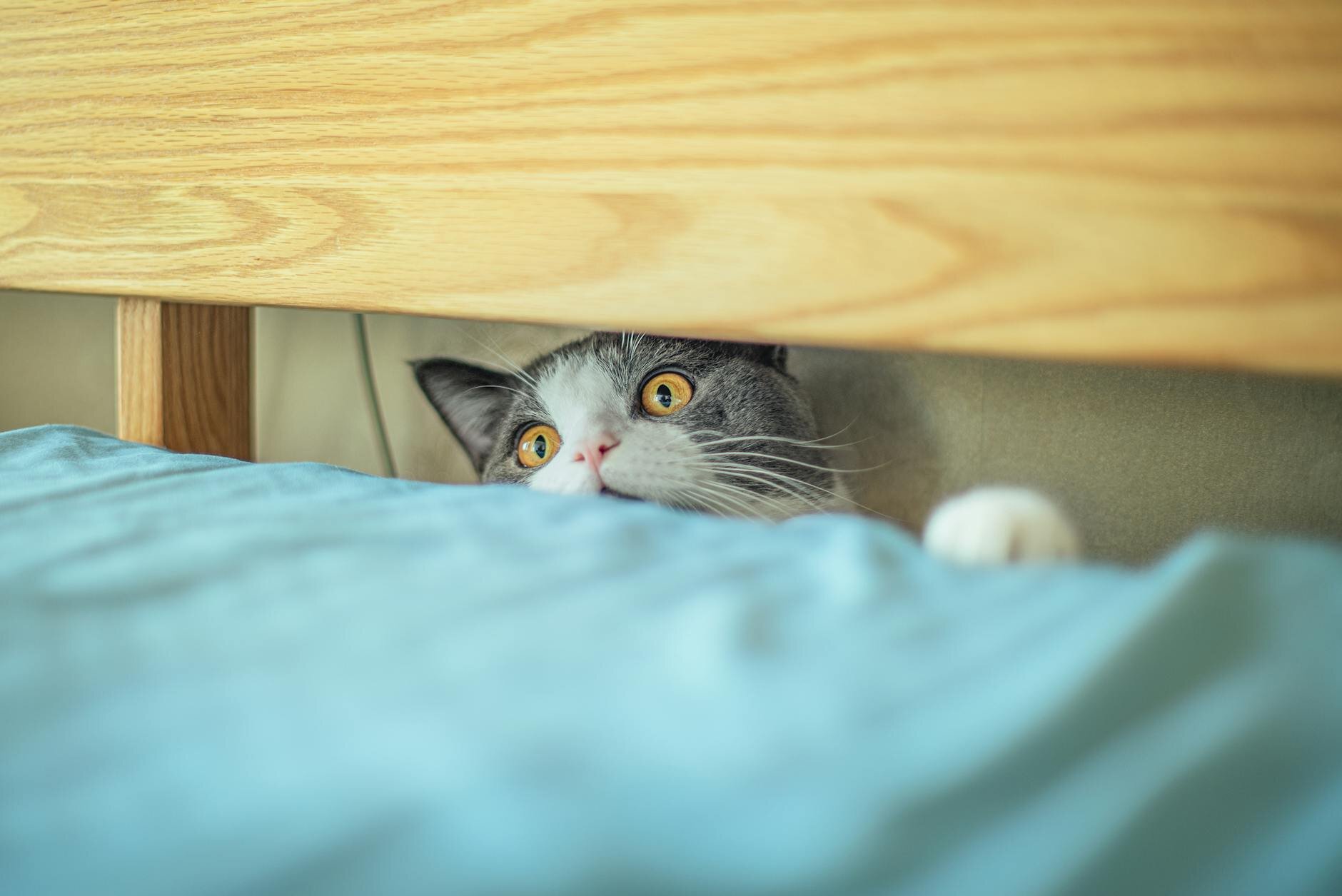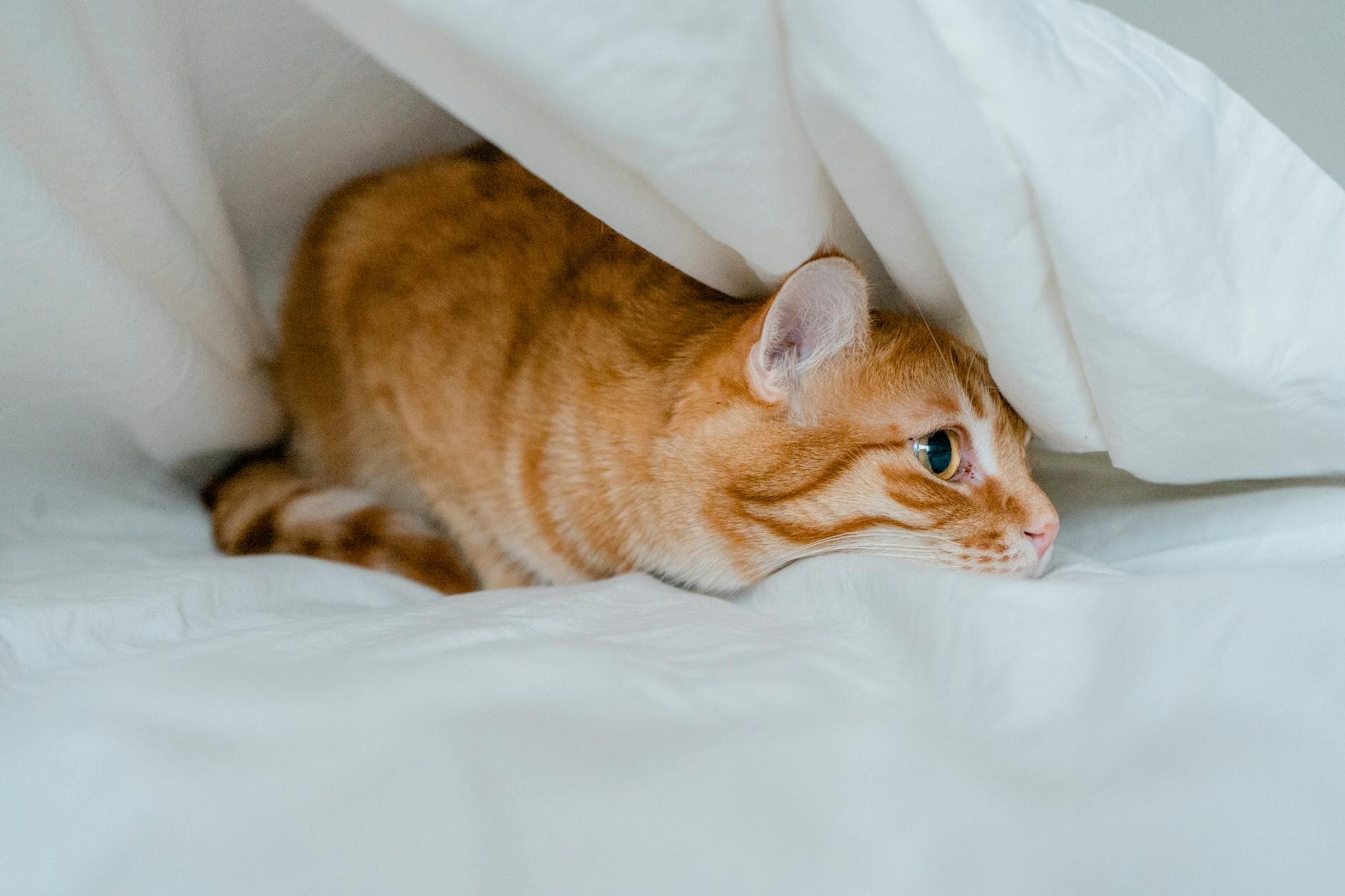Last Updated: 22/07/2025
How to Coax a Cat Out of Hiding
Cats are masters of hiding, loving to be in small cosy spaces. Read about why cats hide, how to find them and how to coax them out.
Author: Dr Jenny Eales BVSc (Hons)
Reading Time: 7 minutes - short read
"Here Puss, Puss, Puss! Come out, come out wherever you are!"
Has that been you lately? Frustratingly, cats are masters of hiding! They love to be in small cosy spaces where they can observe their world and, being such independent souls, will totally ignore you calling them until they are ready to come out!
While this behaviour can be perplexing, it's often rooted in their natural instincts for safety and security. Read on to discover the common reasons why your feline friend might be in stealth mode and learn some gentle, effective techniques to encourage them to emerge.
Why Is Your Cat Hiding?

It can be quite distressing when you can't find your cat. Sometimes they are just in a nice cosy spot and don't want to come out but there are times when they are hiding for other reasons such as:
- Anxiety
- Illness
- New environments or changes to the environment
- Pregnant and about to give birth
Anxiety
When a cat is feeling anxious, they may hide in order to feel safe and secure. Hiding gives them a sense of control over their environment. This is a natural defence mechanism that cats use in the wild to avoid predators or threats. New environments, changes to the environment, new people or new pets, lots of noise, or strange smells can all make cats anxious. If your cat is hiding due to anxiety there are ways to help them feel less anxious and hopefully stop them from hiding. It is important to try and identify the cause of their anxiety so you can address it. If the cause is loud noises for example, you can try to create a quiet, calm environment for them. If it is due to changes in their environment, you can try to gradually introduce them to the changes.
There are a number of supplements containing anxiety relieving ingredients, such as casein and L-tryptophan that you can try to help relax your kitty. Casein is a protein found in milk and is known for its calming effect on newborns. L-tryptophan is the precursor to serotonin, a neurotransmitter that affects mood and decreases anxiety. Serotonin is known as 'the happy hormone'. Feliway is a product containing a man-made version of the pheromone that cats release when they are feeling happy or content, and it can be a great aid to decreasing anxiety in cats.
Hiding due to environmental changes
If you have moved to a new house or had some major changes at home (a new baby, a new person or a new pet for example) your cat may go into hiding to try and feel safe to avoid the changes.
To help your cat come to terms with a new environment, introduce them to it slowly. If you have moved into a new house, only allow your cat to be in a small area to start with and gradually increase the area they have access to as they get used to it. Using a pheromone such as Feliway in their environment is a great way to make them feel calm and relaxed.
If you have a new person or pet at home, introduce them to your cat slowly, making sure they are calm around your cat.
For more information, read through our article on How to Calm an Anxious Pet.
It can be quite distressing when you can't find your cat. Sometimes they are just in a nice cosy spot and don't want to come out but there are times when they are hiding for other reasons such as:
- Anxiety
- Illness
- New environments or changes to the environment
- Pregnant and about to give birth
Anxiety
When a cat is feeling anxious, they may hide in order to feel safe and secure. Hiding gives them a sense of control over their environment. This is a natural defence mechanism that cats use in the wild to avoid predators or threats. New environments, changes to the environment, new people or new pets, lots of noise, or strange smells can all make cats anxious. If your cat is hiding due to anxiety there are ways to help them feel less anxious and hopefully stop them from hiding. It is important to try and identify the cause of their anxiety so you can address it. If the cause is loud noises for example, you can try to create a quiet, calm environment for them. If it is due to changes in their environment, you can try to gradually introduce them to the changes.
There are a number of supplements containing anxiety relieving ingredients, such as casein and L-tryptophan that you can try to help relax your kitty. Casein is a protein found in milk and is known for its calming effect on newborns. L-tryptophan is the precursor to serotonin, a neurotransmitter that affects mood and decreases anxiety. Serotonin is known as 'the happy hormone'. Feliway is a product containing a man-made version of the pheromone that cats release when they are feeling happy or content, and it can be a great aid to decreasing anxiety in cats.
Hiding due to illness
Some cats will hide if they are in pain, injured or unwell. In the wild, cats would hide from predators when they were sick so this is instinctive. If your cat suddenly starts hiding and there have been no changes to their environment or other reasons for them to hide, it is a good idea to get them checked by your veterinarian.
Pregnant cat approaching their due date
Pregnant cats may hide as they are trying to find a safe and secure place to give birth. You can help prevent this by providing several comfy boxes or nests for her and placing them in different areas around the house so she has a few areas to choose from. Choose places that are safe, private, quiet and warm. Show your cat where they are and hopefully she will choose one of them to give birth in rather than hiding somewhere else!
For more information, read through our Pregnant Cat Guide.
Finding Your Cat

It's all well and good knowing why your cat is hiding, but where are they? Cats can find some great hidey holes to hang out in. Here are some ideas for where to search for your missing kitty.
Likely places indoor cats may hide:
- Under beds
- Behind or under furniture
- Up high. Look on top of wardrobes and refrigerators etc.
- In cupboards/cabinets
- In warm spaces/sunny spots
- In washing machines or dryers (close doors and always check these before using as it is extremely dangerous if a cat is in one when it is in use!)
- In baskets or boxes
- In any cosy nooks
If outdoors they may hide:
- In garages, sheds or outbuildings
- Under decks or verandahs
- In bushy plants
- Under cars or vehicles or under their bonnets or wheel arches
GPS Trackers
For cat owners who want peace of mind, GPS trackers offer a high-tech solution to keep tabs on their cat. These small, lightweight devices attach to your cat's collar and use satellite technology to pinpoint their real-time location, which you can then view on a smartphone app.
Some trackers also include features like activity monitoring to track your cat's fitness levels and the ability to set up virtual "safe zones" that alert you if your cat wanders too far. These can be invaluable for quickly finding a lost or hiding cat.
Coaxing them out

Once you have located your cat, how do you get them to come out?
1. Stay Calm!
Your cat can sense when you are anxious or stressed, which can make them more stressed and reluctant to come out. Take a deep breath and try to stay as calm and relaxed as you can.
2. Lure them out.
You can try to lure them out with food or toys. If your cat has a favourite treat or toy, put it near the place they are hiding to try to get them to come out. Make sure to use a calm and reassuring voice. Speak in a soft soothing tone, and avoid making any sudden movements or loud noises that may scare your cat.
3. Give it time.
Don't despair if your cat doesn't come out straight away. Cats are independant souls, and may take a while to come. Make them a safe and comfortable area where you are trying to lure them out. Provide a cosy hideaway bed or blanket, some food and water and their favourite toy and give them some time to emerge. Cats are creatures of habit and may take some time to adjust to a new environment or situation. Provide a safe comfortable environment as described above and keep checking on your cat. Be patient and persistent. Eventually they will come out of hiding.
In conclusion, a cat's hiding spot is their safe haven, and understanding the reason for their retreat is the most important step. Whether they're seeking a quiet nap, feeling anxious about a change, or masking an illness, their behaviour is a form of communication.
By remaining calm, being patient, and creating a secure and inviting environment, you can gently encourage your feline friend to emerge on their own terms. Always remember that a sudden or prolonged change in hiding habits warrants a check-up with your vet to rule out any underlying health concerns.
Further Reading
Want to read more? Check out our other articles:
History
Our experts continually monitor the health and wellness space and we update our articles when new information becomes available.
Wed 23 Jul 2025
Edited by Dr Gillian Hill BVSc (Hons)Dr Jenny Eales BVSc (Hons)
Contributing Author, BVSc (Hons)
Dr Jenny cares deeply about the welfare of animals. She's helped Pet Circle pet owners with some great articles and advice!

